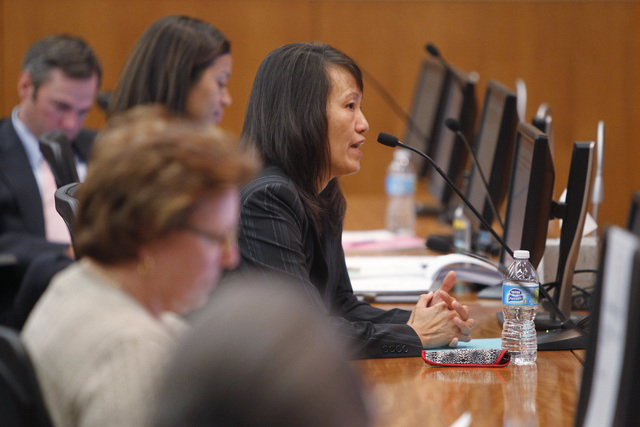North Las Vegas bailiff program fails to produce projected savings
North Las Vegas launched a new bailiff program in 2015, promising the change would save money.
At the time, the city said it planned to spend $500,000 to hire new personnel, but the move would result in a $1.6 million savings.
When asked about the math, City Manager Qiong Liu said the actual benefit the city would reap would be even more. Time would tell.
"A year from now we can give you the facts; we can tell you how much," Liu said then.
So how much has the city saved now that it's been a year?
Nothing.
And it remains unclear whether the new program will ever pay for itself or generate savings.
Since July, when the city's court marshals were transferred to the Police Department to spend more time enforcing warrants, they haven't brought in much of anything from that source, figures provided by North Las Vegas Municipal Court Administrator Cindy Marshall show.
From July to December the year prior, marshals brought in $27,096 from collecting warrants. Marshals, under the court, oversaw court security, while also making time to hit the streets and find people who were wanted by the court for not following a judge's orders. When people don't follow the court's directions, such as failing to show up in court, pay restitution or stay out of trouble, a judge will issue a warrant for their arrest. The warrant includes a fine. Marshals have the authority to show up at the people's homes to try to collect the fine or arrest them.
Plan didn't work
The city's plan in January 2015, as approved by the City Council, was to replace the city's court marshals with bailiffs, who are paid less. That change would reduce the city's $2.1 million annual bill for court security to $500,000 — a $1.6 million savings.
But the city didn't intend to lay off the higher-priced marshals, who were simply shifted to the Police Department, where they were to devote more time to collecting on unpaid warrants. The idea was that getting scofflaws to pay up would cover the bailiff program's costs and even make money for the city.
On paper, the unpaid warrants looked like a gold mine — roughly $38.65 million in potential revenue, according to figures provided by Municipal Court.
But the warrant backlog hasn't been the cash cow of civil dreams.
Many of the roughly 33,000 unpaid warrants still on the books date to the mid-1990s, and about 55 percent are older than five years. The Nevada Supreme Court recommends quashing warrants after five years because they are so difficult to collect on — people move, die, go to jail or simply can't pay.
Collecting those marginal warrants may actually cost more than just letting them slide. If people can't pay, the city's only recourse is to throw them in jail — at city expense.
Another problem: The 33,000-warrant total doesn't mean 33,000 individuals. Roughly 15 percent of the warrants name people with more than one warrant on their records. That makes collecting everything due from them that much harder.
Liu declined interview requests for this article.
The city, in an emailed statement sent Thursday, blamed the court for being difficult. The statement from Liu included a timeline created by the city attorney's office, which is led by City Attorney Sandra Douglass Morgan.
Morgan will run for Municipal Court Judge Catherine Ramsey's seat if the Nevada Supreme Court rules the push to recall Ramsey can proceed.
The recall committee has accused Ramsey of taking an excessive number of days off, misappropriating city money to pay for a private lawsuit and asking employees to perform her personal errands on city time.
Ramsey has argued the recall is political payback because she dismissed cases because of technical errors, depriving the city of revenue, and fought to preserve court funding that the city wanted to take for other uses.
Police department benefited
Regardless of savings, the Police Department is grateful. Police spokesman Aaron Patty called the move invaluable.
Marshals now fill in where the department needs help, particularly with rebooking people into the jail, Patty said. He attributed the lack of warrant revenue to the transition and a need for additional employees. Marshals also had to take time to retrain to join the Police Department, he said, and then there was the time needed to train the new court bailiffs.
"Once we get additional help and more of these guys on the road in more time, we'll definitely be able to see those numbers improve," Patty said.
There were 11 marshals, a sergeant, a lieutenant and two part-time reserve marshals before the shift. Now there are nine marshals and a sergeant.
Patty said police were considering hiring more marshals, but exactly how many hasn't been discussed and a hiring timeline isn't in the works. Having marshals available to pick up people who need to be rebooked into jail has increased the department's efficiency, freeing officers for patrol, Patty said.
Efficiency was one benefit the city cited when the plan was pitched.
For bailiffs, it's been slow going. Hiring has lagged because of trouble finding applicants who can pass background checks. The court has hired four bailiffs, two of whom are part time. The court is still looking for three full-time bailiffs and two part-timers.
Also, a power struggle over how much authority the city is allowed to exert over the court has created delays.
Contact Bethany Barnes at bbarnes@reviewjournal.com or 702-477-3861. Find her on Twitter: @betsbarnes
OUTSTANDING WARRANTS
How old are the 33,000 outstanding North Las Vegas Municipal Court warrants?
10 percent were issued before 2000
15 percent were issued in 2001-2005
30 percent were issued in 2006-2010
45 percent were issued in 2011-2015
— North Las Vegas Municipal Court






















